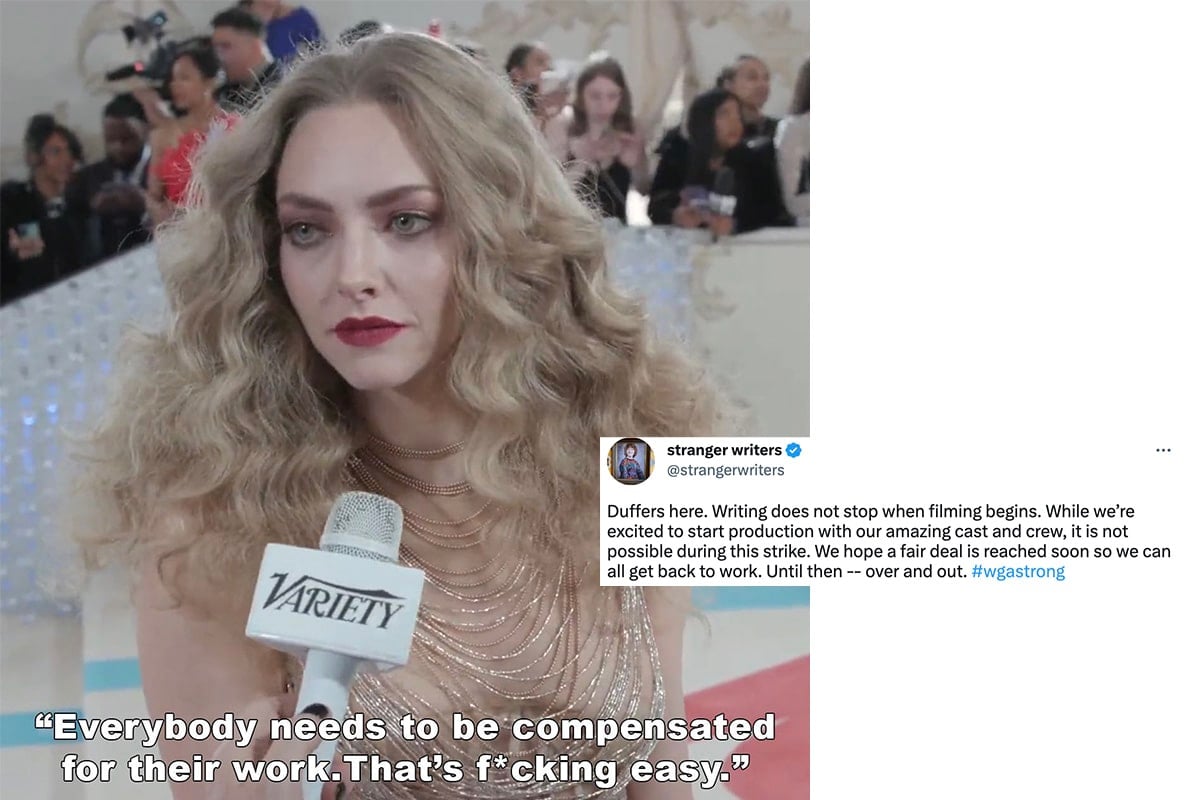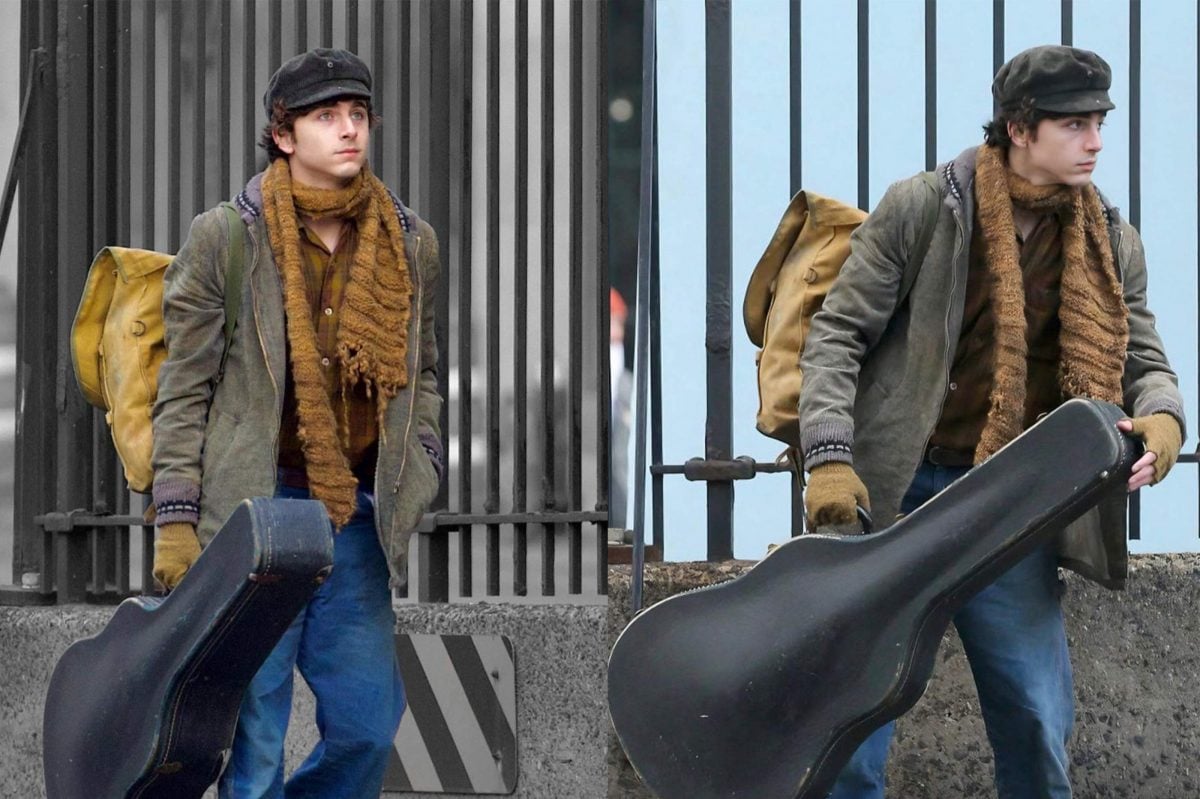
There's always a lag when it comes to topical news in countries like the US. A brief pause as we measure up how the state of affairs will be felt in Australia. When the Writers Guild of America (WGA) called for a strike late into the evening on May 1, after negotiations faltered between the body and Alliance of Motion Picture and Television Producers (AMPTP) when the latter failed to agree on a new contract that would safeguard working conditions for WGA members, all we had to go off was the last time the WGA called for a general strike back in 2007. Considering that TV and film writers across the US returned to work only after 100 days, this could have a knock-on effect on our own television and film watching habits, with production at a standstill for a host of different television shows. So what TV shows are affected and what demands are the WGA lobbying for? All the details, below.
Why has the WGA called for the strike?
If streaming platforms have transformed the way we watch TV, it should come as no surprise that this format has disrupted traditional work environments for the industry too. The WGA negotiate a new contract with the AMPTP every three years with discussions kicking off on March 20. As the negotiations dragged on into mid-April, 97.85% of WGA members voted in favour of a strike if their terms were not met.
“Gotta support the writers man. No shows without the writers.”
-Pete Davidson as he passes out pizzas to Writers Guild members on strike pic.twitter.com/zrVUyU1vdN
— Steve 🎥 Supports the WGA (@SteveRogers1943) May 6, 2023
So what were those terms? The first demand revolved around residuals. Residuals, for those unfamiliar with the word, are basically royalties for screenwriters. Writers receive residuals for both regular TV and a streaming services, however they receive a set amount from streamers regardless of whether the show is a success or not. Whereas broadcast TV uses a model which rewards successful shows, meaning writers can earn extra if the show they worked on is a hit. This has been the industry standard for years, however when streamers came along this was not factored into the model and as a result, wages are stagnating. This, compounded with shorter seasons and streamers dropping old series altogether from their offering, means writers are limited in what they can earn.
Which leads us onto mini rooms, a smaller, watered-down version of the typical writers room that's become the norm among streamers and is cause for concern for the WGA. Containing 2-3 writers as opposed to 7-8, the idea is that writers in mini rooms (who typically earn less) will create a number of episodes of a show, instead of a single pilot, before it's even picked up for production. If the series is picked up, the episodes are already written leaving little use for writers during production. Basically, more labour and less compensation.
Writers strike picket signs still undefeated perfection pic.twitter.com/G7uyErHhmQ
— Fuck You I Quit (@fuckyouiquit) May 5, 2023
The final point of contention for the WGA strike is the introduction of AI. Like any story, we all know TV and film is highly formulaic, which means the process can be replicated especially by AI. The fear is that, instead of paying writers for their ideas and labour, studios will cut costs and outsource it to AI and just hire writers to dress up scripts. As you can see, these are all reasonable concerns, and as Amanda Seyfried told a Variety reporter during the Met Gala red carpet, "everything changed with streaming, and everybody needs to be compensated for their work. It’s fucking easy."
enjoy this clip of amy ryan & patricia clarkson *quite literally* reading the phone book during the writers strike in 2007 💀 pic.twitter.com/ZRz9xgv2YU
— ‘ (@amyryanpage) May 5, 2023
What TV shows will be affected?
We'll begin to see the initial consequences of the WGA strike with shows that are topical and require fast turnarounds. These tend to be late night talk shows like SNL, Jimmy Kimmel, The Tonight Show Starring Jimmy Fallon – you get the gist. As was the case in 2007, where we saw daily talk shows cease airing new episodes.
Next up, Network TV will be brought to a halt. While most of them have wrapped up production for the summer anyway, if the strike continues for as long as it did 15 years ago, we may have to wait longer for new seasons of Abbott Elementary, Billions and Chicago.
Daytime soaps will suffer next, which is a problem if you're still keeping up with programs like The Days of Our Lives. Meanwhile, streaming platforms will be the last to feel the impact, as they tend to have more series and films banked up, along with a variety of strategies to implement if they should need to. However, the first week of strikes has already delayed production for the final season of Stranger Things, The Last of Us, A Knight of the Seven Kingdoms: The Hedge Knight and Only Murders in the Building. The writers room for Cobra Kai season 6 and Yellowjackets season 3 have closed also.
On the other hand, production will continue for hit series like House of the Dragon and The Rings of Power, with all the scripts turned in for the former, and despite executive producers J.D. Payne and Patrick McKay not present on set for the latter. Will this impact the quality of both series? We'd like to hope not, but who can say.
Image: @evanrosskatz



